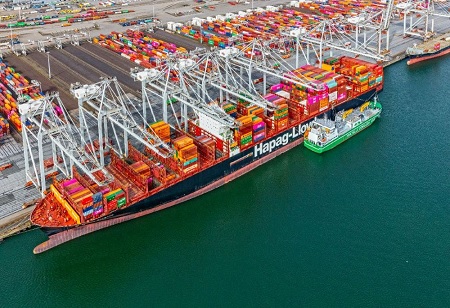
Scan Global and Hapag-Lloyd Forge Major Biofuel Pact in a New Green Drive

 Scan Global Logistics (SGL), a prominent global transporter and logistics solutions provider, and Hapag-Lloyd, one of the globe's major container shipping companies, are pleased to declare a substantial partnership aimed at a multimillion-dollar ocean biofuel initiative. This noteworthy collaboration highlights a significant advancement in the sustainability goals both companies are committed to achieving together.
Scan Global Logistics (SGL), a prominent global transporter and logistics solutions provider, and Hapag-Lloyd, one of the globe's major container shipping companies, are pleased to declare a substantial partnership aimed at a multimillion-dollar ocean biofuel initiative. This noteworthy collaboration highlights a significant advancement in the sustainability goals both companies are committed to achieving together.
With a focus on sustainability embedded in the core strategies of both enterprises, SGL and Hapag-Lloyd have initiated a progressive endeavor to incorporate biofuels into their maritime activities. Through the utilization of biofuels sourced from renewable origins, these collaborators aspire to aid customers in significantly curbing carbon emissions and play a part in the worldwide endeavor to address climate change.
“This partnership not only allows us to reduce emissions but also reinforces our commitment to delivering sustainable logistics solutions that benefit our customers and society as a whole”, says Mads Drejer, Global COO & CCO at Scan Global Logistics.
The integration of biofuels in maritime shipping signifies a noteworthy milestone in the industry's quest for carbon neutrality. Through commitments to sustainable measures, SGL and Hapag-Lloyd are making substantial strides for the logistics sector, paving the way towards a more environmentally sustainable tomorrow.
“We are delighted to have SGL as our valued partner supporting our Ship Green initiative”, says Tom De Wilde, Senior Director Global Sales at Hapag-Lloyd. “Together, we are demonstrating our shared dedication to decarbonization and driving positive change in the shipping industry in line with Hapag-Lloyd’s commitment to operating a net-zero fleet by 2045”.
Through this cooperative endeavor, SGL and Hapag-Lloyd aspire to forge a lasting partnership to advance the expansion of sustainable transportation solutions. This alliance demonstrates the feasibility of contributing to collective endeavors aimed at decarbonizing both the maritime industry and the logistics sector through the utilization of presently accessible biofuel solutions.

